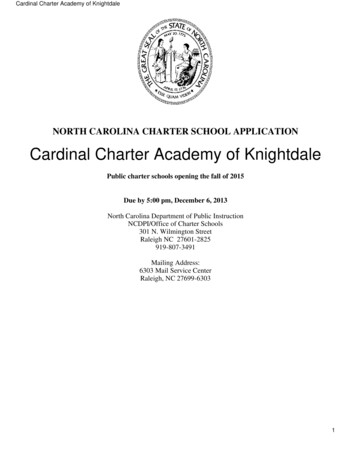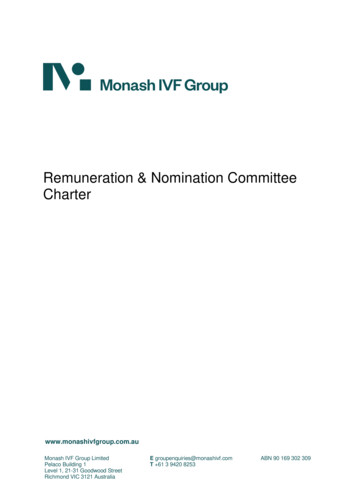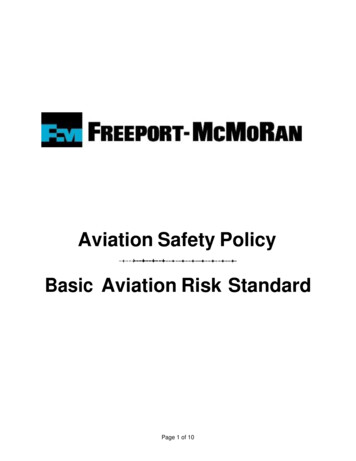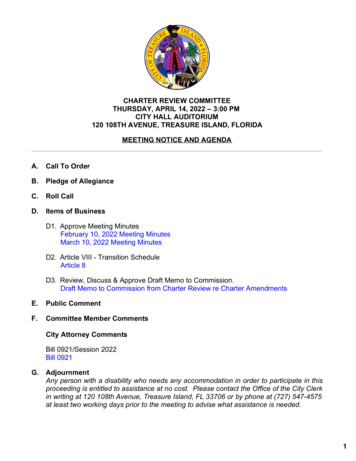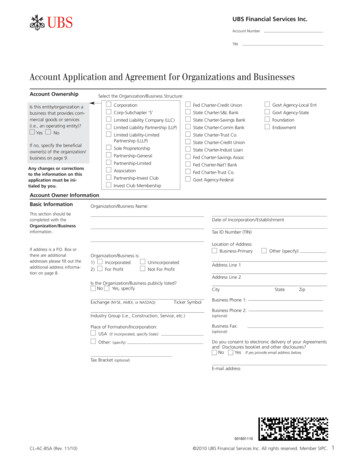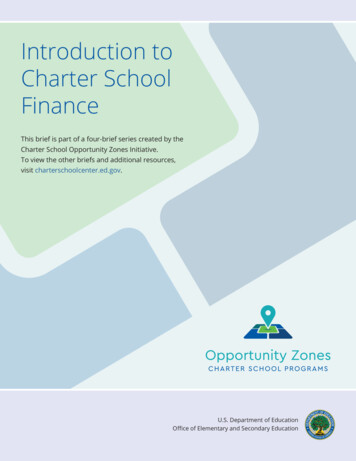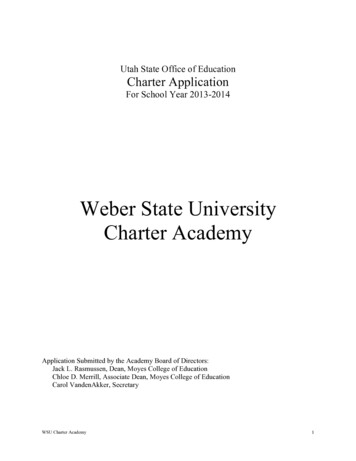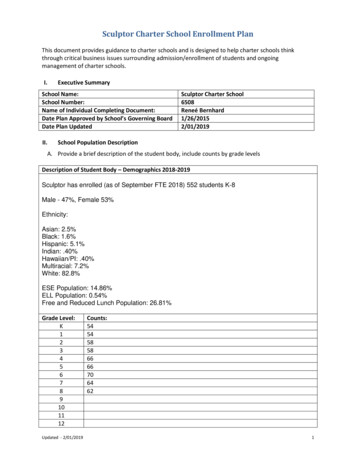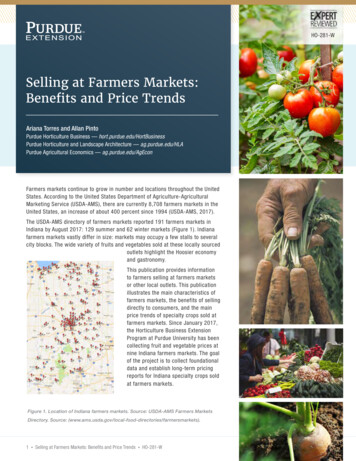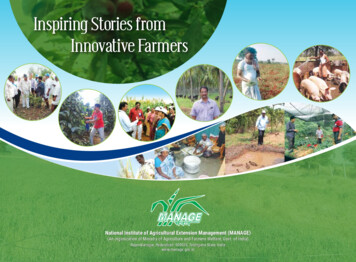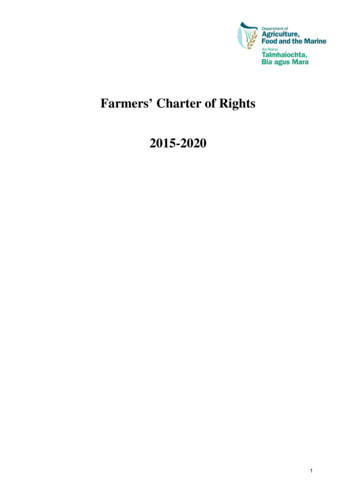
Transcription
Farmers’ Charter of Rights2015-20201
The operation of a number of Schemes in this Charter is governed by EU law/ national lawwhile others are governed by national law only. It should be noted that this Charter cannotgrant rights which would affect or change the operation of those laws in so far as they applyto the Schemes in question.2
CONTENTSA.Customer CharterGeneral Commitments to all our customersB.Farmers’ Charter of RightsGeneral Commitments to our Farmer Customers(in addition to our Commitments in the Customer Charter)C.Specific Commitment under Schemes and Services 2015-2020CAP Pillar I1. Basic Payment Scheme (BPS)CAP Pillar II2. Areas of Natural Constraint Scheme (ANC)3. Beef Genomics and Data Programme4. Knowledge Transfer Scheme5. Rural Environment Protection Scheme (REPS)6. AEOS7. GLAS (Green Low-Carbon Agri-Environment Scheme)8. Organic Farming Scheme (OFS)9. TAMS II (Targeted Agricultural Modernisation Scheme)Exchequer Payments10. Forestry Grant and Premium Schemes11. Horticulture12. Animal Health SchemesAnnex 1 – ToleranceAnnex 2 – Types of Inspections TableAnnex 3 – Contact detailsAnnex 4 – Glossary of Abbreviations and TermsAnnex 5 – Farm Safety MessageAnnex 6 – Inspection Advisory Notice3
A.Customer Charter - Main PointsThe Charter aims to enhance the delivery of services and schemes to clients of the Department.Contact by TelephoneIn order to protect your privacy rights and to comply with data protection requirements you may berequired to answer a security question when dealing with the Department. We will aim to answer your calls within 20 seconds. We will give our full name, Section name (and contact details as appropriate) We will try to answer your questions straight away. If we cannot do so, we will take yourdetails and tell you when you can expect to hear from us again. Messages left on voicemail facilities will be dealt with promptly and we will aim to have callsreturned within 1 working day.Contact by Letter or e-mail Correspondence will be responded to within a maximum of 20 working days.Where this is not possible an interim response will be issued to you within 10 working dayswith the contact details of the person dealing with your correspondence and the date whenyou can expect a full response.The name of the staff member signing the letter will be printed on all correspondence.Meetings Meetings will be arranged, where possible, at a time that suits you and we will not keep youwaiting unnecessarily.At all times we will make every effort to ensure that business is done in private and. wherepossible, we will provide a private meeting room to discuss your query.We will try to answer your questions fully. If we cannot do this we will arrange to phone you,or write to you if you prefer or arrange a further meeting where appropriate.Information Sources We will continue to appropriately inform clients of significant developments in a proactiveway through our website, texting and the use of local and national media and will providecomprehensive information on all our schemes and services in a user-friendly format. Inaddition, where possible we will write to farmers where there are significant changes to anyscheme.We will arrange and attend public information meetings on major changes where appropriate.We are committed to the continued development and improvement of our online services.What you should do when contacting the Department Quote reference numbers, where available, in all correspondence and communications;Providing a daytime telephone number or e-mail address in your correspondence if available;Provide accurate and clear information and submit all necessary supporting documentation;Check that applications are fully completed and signed;Submit applications in sufficient time before the closing date and obtain proof of posting;Ensure correspondence is sent to the correct address;Inform us of any changes in circumstances which may have a bearing on your application;Respond quickly to any queries or requests for any additional information in support ofapplications.You may provide comments, complaints or suggestions regarding the service youreceive to: The Quality Service Unit. See Annex 3 for contact details.The complete Customer Charter document can be accessed at:www.agriculture.gov.ie/customerservice4
Farmers’ Charter of RightsB.In addition to the general commitments made in our Customer Charter we are making further,specific, commitments to our farmer customers: DAFM will ensure that decisions and payments will be made within the deadlines as agreedunder the Department’s Farmers’ Charter of Rights 2015 – 2020.The Department will fully consult with the Farming Organisations on all scheme detailsUp to date information on schemes will be provided to farmers in a user-friendly format.The provision of up to date information on the appeal procedures available if an application isunsuccessful or a penalty is applied.Every farmer has a right to appeal all decisions made by the Department of Agriculture andthe appeals process will take account of all the circumstances in every case. Only certaindecisions will go to the AAO in line with their legislation.Department staff will fully co-operate in any appeal process.Decisions will be based on what is relevant in the rules and regulations governingentitlements under each scheme. Scheme applications and claims will be dealt with correctly,consistently, fairly and impartially in accordance with EU Regulations and the relevantscheme’s terms and conditions.With a view to helping to ensure that scheme applications are successful, the Department willprovide information on time limits and conditions that it is necessary to comply with.The Department will attend, in so far as is practicable, farmer meetings to explain and clarifythe details in respect of all schemes.Farm Safety AwarenessWhile the Health and Safety Authority is responsible for safety and health in the workplace, includingfarms, DAFM will endeavour to assist in raising awareness of farm safety. Please see Farm SafetyMessage on Annex 5 to this document. Further information on Farm Safety is available on the DAFMand HSA websites.On-Farm InspectionsNumber of InspectionsUnder the Farmers’ Charter and in line with EU Regulations, the following level of on-farm inspectionswill be undertaken by the Department of Agriculture across the various Farm Schemes:Rate of Inspections TableFarm SchemeBasic Payment Scheme and Young Farmers Scheme Land eligibility inspectionAreas of Natural ConstraintGreeningInspection Rate5% of beneficiaries – circa6,50065% - 85% carried out byremote sensing5% of beneficiaries – circa 4500to 5000 in 20155% (All Requirements)5
(10% for EFA) of beneficiaries(who require greening practices)- circa 800 – 1000Cross Compliance1% of beneficiaries – circa 1,300Bovine ID and Registration3% of herds – circa 3,500Ovine/Caprine ID and Registration3% of flocks (must meet 5% oftotal sheep numbers) – circa1,200Local Authority NitratesCirca 1,650Beef Genomics and Beef Data Programme5% of active participantsREPS/AEOS/GLAS5% of active participantsSTAP ( BTAP and Dairy Cash plan gone in 2015)5% of active participantsOrganic Farming Scheme5% of active participantsBurren Scheme5% of active participantsTAMS II5% - 20% Pre-approval5% - 20% - Pre-payment5% - Post PaymentNote: Some Inspections will be conducted by remote sensing. Inspections may be integrated therebyreducing the overall number of farms visited.General PrinciplesIn relation to on-farm inspections the following principles will apply:1. On Farm Inspections are a requirement of the EU Regulations and the terms and conditions ofmany schemes operated by DAFM.2. The inspection approach and reporting system used will be standardised across all areas of thecountry to ensure consistency and fair treatment of all farmers3. Inspection staff will be provided with ongoing training and information on how to conducttheir inspections and the scheme requirements4. Inspection staff will be provided with the necessary health and safety training and equipmentto carry out their work5. Procedures are simplified with a view to ensuring a clear understanding of the requirementsamongst farmer clients;6. In the case of notice inspections, if an inspector has been unduly delayed the applicant will becontacted, by phone, as soon as possible before the appointed time for the inspection. If theinspection cannot be carried out on the appointed day an alternative arrangement will bemade, in agreement with the applicant;7. Inspections will normally and, where practicable, start at the hub/main holding8. The inspecting officer will on arrival introduce him/herself to the farmer, or other personpresent, and produce official identification;9. If the applicant cannot be present, he/she can be represented by a person of his/her choice.10. If the inspecting officer cannot locate anyone on the farm when they arrive to complete anunannounced inspection they will leave and return another day. On their second visit, should6
.nobody be present the inspection officer will ring the applicant and proceed to conduct theinspectionThe inspecting officer will provide the applicant / agent with inspection notice information,explain the nature of the inspections and, if possible, how selection was made (i.e. risk vsrandom) ;In the case of a refusal on the part of the applicant to allow the inspection to proceed withoutgood reason (e.g. serious illness, bereavement etc), the inspector will advise the applicant ofthe possible implications of such a decision, including the possibility of total loss of payment.An appropriate ‘cooling off’ period will be allowed for both parties to reflect on theirposition. This ‘cooling off’ period may also be provided in the event of a disagreement arisingduring the course of an inspection. The applicant/agent will then be allowed the opportunityto reconsider his/her decision. Should the applicant continue to refuse to allow the inspectionto go ahead, the inspecting officer will report the matter and circumstances to his/hersupervisor. Should the inspection not proceed on the day without good reason the applicantwill be informed that payment may not be possible. Flexibility will be given for the inspectionto be rescheduled where there is serious illness, bereavement or other good reason;Inspection staff will be provided on an ongoing basis with guidance on the need to treat thefarmer with the utmost respect and fairness;On-farm inspections will be integrated, which may result in multiple inspections on certainfarms;Where the purpose of the visit by the inspecting officer is a combined notice/no-noticeinspection, this will be clearly explained by the inspecting officer to the farmer;All no notice inspections will be conducted separately from all notice inspections unless thefarmers requests otherwise. A written notice will be given to the farmer on arrival;The Inspector will inform and will agree with the farmer when he will return to complete thenotice elements of the inspection;The no-notice inspection must be carried out on the day;Breaches noted in respect of deferred inspections cannot be ignored;Inspections will not delay payment where there are no outstanding farmer issues;Where the only outstanding issue is completion of the cross compliance inspection paymentwill not be delayed;Some errors, while in breach of an SMR, which are minor in nature, may not attract asanction;Except in unforeseen circumstances, all eligibility inspections will be conducted by theplanned date for the commencement of payment and will ensure that all clear and validapplications are paid from that date;On the day of the visit, the farmer / representative of the farmer, if present, will be providedwith a preliminary inspection report which will include a preliminary notice of findings. Thefarmer / representative of the farmer, though not obliged to, will be given the opportunity tosign the report. The farmer / representative of the farmer will also be given the opportunity tocomment on the preliminary inspection report. Any comments will be noted in the report. Ifthe farmer chooses to sign this report it doesn’t prejudice his position in respect of anypenalties that may arise.Land eligibility type inspections may be conducted remotely and where necessary may befollowed up by a ground inspection.With inspections involving sheep, the Department will take account of the circumstances andfollow agreed protocols with the farming bodies in relation to penning at lambing timeIn carrying out inspections in hill sheep areas, the Department will take account of the timingof inspections relative to lambing and when sheep move to and from the hills, provideadequate notification and tolerances to take account of the unique circumstances and losses inthe hill areas.7
Notification of Inspections TableFarm SchemePurpose(Eligibility, areaetc)Announced orUnannouncedNotice Period GivenNotice period in daysBasic PaymentScheme EligibilityEligibilityrequirementsNotice given may be upto the maximum periodallowableMinimum necessary but upto a max of 14 daysBasic PaymentScheme – CrossComplianceCross Compliancerequirements (FullCross Complianceincluding all SMR’s &GAEC)May be announced wherethis does not interferewith the purpose oreffectiveness.May be announced withthe exception of Food &Feed Hygiene, TSE andAnimal Welfare wherethis does not interferewith the purpose andeffectiveness.Notice given may be upto the Maximum periodallowableMinimum necessary but upto a maximum of 14 daysNotice given may be upto the maximum periodallowableMinimum necessary but upto a max of 48 hoursNotice given may be upto the maximum periodallowableMinimum necessary but upto a max of 14 daysNotice given may be upto the maximum periodallowableMinimum necessary but upto a max of 14 daysNotice given may be upto the maximum periodallowableMinimum necessary but upto a max of 14 daysNotice given may be upto the maximum periodallowableMinimum necessary but upto a max of 14 daysNotice given may be upto the maximum periodallowableMinimum necessary but upto a max of 14 daysNotice providedNotice given is normally 2448 hrsNo notice on andRegistrationGreeningGreening requirementsAreas Of g farmerEligibilityrequirementsBeef Data sGLAS,GLAS Compliance withGLAS commitmentsMay be announced forAnimal Identification andRegistration where thisdoes not interfere withthe purpose oreffectiveness.May be announced wherethis does not interferewith the purpose oreffectivenessMay be announced wherethis does not interferewith the purpose oreffectivenessMay be announced wherethis does not interferewith the purpose oreffectivenessMay be announced wherethis does not interferewith the purpose oreffectiveness.May be announced wherethis does not interferewith the purpose oreffectiveness.May be announced wherethis does not interferewith the purpose oreffectivenessAll inspectionsunannouncedCompliance withREPS commitmentsAll inspectionsunannouncedNo notice givenUnannouncedREPSCompliance withAEOS commitmentsAll inspectionsunannouncedNo notice givenUnannouncedAEOS8
Selection of Cases for InspectionThere are two methods by which cases may be selected, i.e. randomly and by risk. The Regulationsrequire that between 20% and 25% of cases are selected randomly from the entire population and theremaining cases are selected by risk. The effectiveness of the risks used must be monitored each yearand adjusted as necessary to ensure that the risk factors used are relevant and effective. Commontypes of non-compliance will be published on the Department’s website annually.Remote sensing is a technique where recent images captured by satellites are used to confirm the areaand ground cover of land parcels thereby avoiding the need for a ground inspection.Public Liability IndemnityThe Department is covered by State Indemnity in respect of its officers carrying out their officialduties at any location. See State Claims Agency website for more information at http://stateclaims.ie/Information Technology and Online Services We are committed to the continued development and improvement of our online services.This will include a facility to register for the Department’s existing and future electronicservices and receive updates by email and/or short messaging service (SMS).While online services are currently available for Payment schemes, Animal Movement andTraceability, Forestry, Agri- Environment and others, we will continue to expand andimprove these services where feasible.We are committed to the rollout of the “Financial Self Service” facility where theDepartment’s clients will have the ability to (a) securely view all of their payment detailsincluding remittance text (b) view, copy and print the annual payment statement and (c) usedebit/credit cards to pay any fees or debts.Our website will provide comprehensive information on the Department’s activities and allour schemes and services and continue to appropriately advertise significant developments.Payments Summary TableFarm SchemePayment Dates/TargetsAreas of NaturalConstraint (ANC)Full payment to commence in the third week ofSeptember with target of 100% payment in respect ofclear casesBasic Payment SchemeandGreening PaymentAdvance Payments: 100% of cleared cases and 90% ofall applications to be paid on 16 OctoberBalancing Payments: a target of 100% of allapplications on 1 DecemberYoung Farmers SchemeTarget payment date of 1 December for all applications.Paid as a complete payment.National ReserveTarget payment date of 1 December for all applications.Paid as a complete payment.AEOS/GLAS/REPSPayment of up to 75% will commence third week ofOctober.Payment of 25% balance will commence when allinspections completed, normally mid-December.9
TAMS IIPayment will issue within 3 weeks of approval forpayment when it has been determined that the work hasbeen completed in accordance with the terms andconditions of the schemeBeef Data & GenomicsPayments will commence in mid-December in the yearof applicationKnowledge Transfer100% Payment will issue in the 3 month period aftercompletion of annual contract.Organic FarmingSchemePayment of up to 75% will commence third week ofOctober.Payment of 25% balance will commence when allinspections completed, normally mid-December.Burren SchemePayments will commence in February of the followingyear, with 100% payment made by single instalment.The current scheme is being rolled over into 2015 andduring that year the details of the new scheme will bedeveloped (This scheme will be restructured andexpanded from 2016 onwards and new targets will berequired at that stage)Area Based Annual Schemes(Schemes include: BPS, Greening, ANC, Young Farmers Scheme, National Reserve, BurrenScheme)Information for Applicants A set of the most up to date maps available, a covering letter, pre-printed application Formsand Scheme Terms and Conditions, including a synopsis of changes, will issue to allapplicants well in advance of the Basic Payment Scheme (BPS) deadline for the receipt ofapplications. All documentation will issue in the same envelope.Dedicated help-lines will operate throughout the year to answer queries on how to completeapplication forms, options available for submitting applications and all other queries such aspayment dates and amounts due.Reception desk facilities, at the Portlaoise Offices, will be in place to facilitate applicants withqueries relating to the BPS and other schemes.Conferences, Information Seminars and attendance at major public farming events will bearranged, e.g. the National Ploughing Championships.Regular updates will be provided via farming media outlets on application deadlines and BPSapplication form requirements.Application ProcessCompleted Application Forms and accompanying maps will be accepted on-line, or in hard copy byPost or hand delivery to The Direct Payments Unit. See Annex 3 for all contact details.Agents that submit applications on behalf of farmers must be registered and approved by theDepartment.10
Payment ProcessCurrent EU Regulations provide that payments under the Basic Payment Scheme shall be made withinthe period from 1 December to 30 June of the following calendar year. Payments shall be made in amaximum of two installments within that period. The regulation further allows Member States, priorto 1 December but not before 16 October, to pay advances for up to 50% for those direct payments. 50% advance payments will commence automatically on 16 October each year with a targetof paying 100% of cleared cases and 90% of all applicants in the first week.Balancing payments will commence on 1 December each year with a target of paying 100%of all applicants on that date.o For 2015 both of the above will be based on provision entitlements with any balancesdue to be paid in March 2016ANC payments will commence in the 3rd week of September with a target of 100% of clearedcases in that week.Resolving Problems and QueriesAll queries following application, with the exception of stocking density queries, are notified toFarmers as soon as possible after identification and, at the latest before 1 September on ANC and 15thSeptember on BPS. If the applicant responds within 14 days and provided the response issufficient to clear all outstanding difficulties, the application will be finalised for payment by thedeadline date. The Department will aim to have all problems dealt with by 15 September forapplicants in ANC and by 15th October for all other applications.The Department makes regular payment runs after 16th October to ensure all clear applications arepaid promptly.Other Schemes(Schemes include: REPS, GLAS, GLAS , AEOS, Organic Farming Scheme, TAMS II,Knowledge Transfer )The following documents will be available on the Department’s website: Terms and Conditions Application Form/Online equivalent process Reference Costs Marking Sheet Technical SpecificationsApplication Process Application forms will have to be completed online for most schemes - agent access will befacilitated.Ranking of applications will take place on a tranche basis. Unsuccessful eligible applicationswill be carried over to the following tranche.Payment ProcessPayment will issue when it has been determined that the work has been completed in accordance withthe terms and conditions of the scheme concerned. A deadline will be applicable for completion ofthe relevant investment works.11
Nitrates DerogationOn application of controls as set by Nitrates regulations, the overall objective is to ensure credibleimplementation of the regulation and supporting the continuance of the Derogation secured by Irelandunder the Directive.To assist farmers to remain within the limits, DAFM will continue to: Publish interim Nitrogen and Phosphorus statements online for three periods each year (Jan toJune, Jan to August and Jan to October) Issue webtexts giving Nitrogen per hectare figures for the same interim periods to thosefarmers projected to be close to or above the 170kg limit at the end of the year and who areregistered for this service Issue end of year Nitrogen & Phosphorus statements to those farmers who exceed the limits inthe calendar year Issue end of year webtexts to those farmers close to the 170/250kg limit in the relevant yearand who are registered for this service.Attention is drawn to the requirement that documentation submitted by farmers to reduce nitratesfigures, i.e. Records 3 (exports), 4 (temporary movements – sheep only) and 5 (rental/grazingagreements) must be submitted not later than the 31st of December of the relevant year.In the context of an improved situation the number of nitrates inspections will be reviewed goingforward.Complaints, Review and Appeals ProceduresHow to make a complaintWe will work hard to meet our customers’ expectations and requirements.If you are unhappy about any aspect of our services and general service commitments, please contactthe manager of the division concerned who will look into the matter for you.You can also write directly to the Quality Service Unit. We will acknowledge your complaint within3 working days and aim to deal with your complaint within 15 working days. If we need to carry outfurther research we will let you know and try to have completed this within 30 working days. Fulldetails can be found in our Customer Complaints Procedure.Complaints may also be made under Investigations Division’s Code of Practice (a copy of which isavailable on the Department’s website). Such complaints can also be sent directly to the QualityService Unit.Complaints may also be raised at the Monitoring Committee in relation to the above issues.Contact details for the Quality Service Unit are in Annex 3.The Investigations Division will be subject to the same complaints, review and appeals procedures asall other divisions of the Department. The Investigations Division will also be subject to the CharterMonitoring Committee.Review/ Appeals ProceduresInternal ReviewRequests for review or appeal can arise for many reasons. Appeals may arise from administrativechecks or from the inspection process, be it remote or on the ground. The process provides in the firstinstance for an internal review within the Department followed by an external review if necessary.12
Administrative Procedures ReviewWhere farmers are unhappy with the outcome of their scheme application or administrativerequirements they may, in the first instance, seek in writing, a review of the decision. Reviews can besought in the first instance from the manager of the particular payment section {scheme] involved. Inthe case of payments under the Basic Payment Scheme (BPS), initial review requests should beaddressed to: Decision maker name (usually HEO/Manager), The Direct Payments Unit. See Annex3 for contact details.Ground Inspection Cases (Eligibility/Greening/Cross Compliance) ReviewFor the BPS, if the farmer is dissatisfied with the inspection findings he/she can seek a review of thedecision to the relevant District Inspector, as detailed in the inspection findings notification letter (FNletter).Remote Sensing Inspections ReviewIf the farmer wishes to seek a review of the results of a remote sensing inspection he/she can submit areview request to Remote Sensing Inspections Sections. See Annex 3 for contact details.Other Inspections ReviewWhere the applicant is not happy with any other inspection findings he/she can seek a first stageinternal review within the inspection service. Notice of findings letters will provide details on theappeal options available and the contact details.AppealIf the internal review does not resolve the position to the satisfaction of the farmer, appeals can bemade to the Agriculture Appeals Office (AAO), which is an independent statutory agency, whichprovides an independent, impartial and free appeals service to farmers who are dissatisfied withdecisions of DAFM regarding their entitlements under certain schemes. Appeals must be submitted tothe AAO within three months of the date of letter of notification to the farmers of the final decision ofthe Department. In certain cases, where the director considers it appropriate, this 3 month deadlinecan be extended on a case-by-case basis. The Agriculture Appeals Act 2001, along with theAgriculture Appeals Regulations 2002 (as amended), set down the functions of the office, thedecisions that may be appealed and the procedures to be followed in respect of agriculture appeals.From the date of receipt of all relevant documentation, the Appeals Office will aim to conclude itsfindings within a 3 month period.Full details of appeals procedures, including details of the Schemes covered are available on theAgriculture Appeals Office website at www.agriappeals.gov.ie or from the Department’s local offices.Appeals should be addressed to the Agriculture Appeals Office. See Annex 3 for contact details.If at the end of the appeals procedure the applicant feels his/her case has not been dealt with properlythey can seek the assistance of the Ombudsman by contacting the Office of the Ombudsman. SeeAnnex 3 for contact details.Charter MonitoringA Committee will be established to monitor the implementation of this Farmers’ Charter.Structure and role of the committee: The Committee will be chaired by an independent Chairperson;The Chairperson will be appointed by the Minister following consultation with the FarmBodies;The Farm Bodies and the Department will be represented on the Committee;The Committee will meet three times a year, or otherwise as agreed;Service delivery and payment deadlines/targets in respect of new schemes, or changes toCharter commitments, may be examined by the Committee.13
The Committee will monitor; Progress towards achievements of payment/decision targets established under this Charter;Progress towards achievement and implementation of other targets established under thisCharter;Standards of service in respect of schemes and services across all Divisions, includingInvestigations Division, to which this Charter applies.Standards of service in respect of any new schemes introduced during the lifetime of thisCharter.The Department will provide the Monitoring Committee with sufficient information to effectivelycarry out its role.SimplificationOn simplification, the Minister and the Department are pursuing a compressive simplification agendaon inspections, direct payment and cross compliance under the initiative launched in January 2015 bythe EU Agricultural Commissioner and the outcomes as appropriate will be adopted as part of theimplementation of the Farmers Charter 2015-2020.14
Spec
A. Customer Charter General Commitments to all our customers B. Farmers' Charter of Rights General Commitments to our Farmer Customers (in addition to our Commitments in the Customer Charter) C. Specific Commitment under Schemes and Services 2015-2020 CAP Pillar I 1. Basic Payment Scheme (BPS) CAP Pillar II 2.
